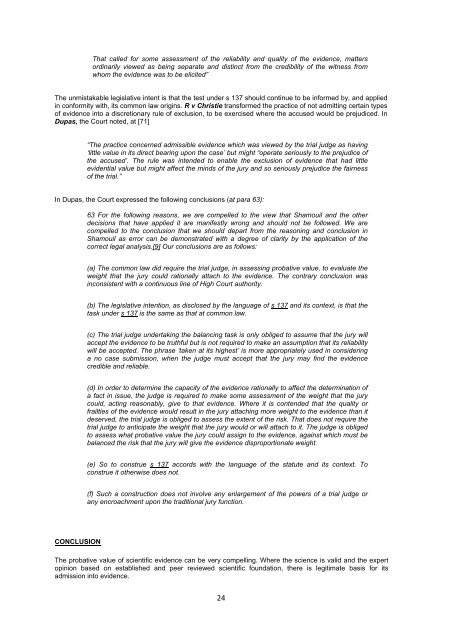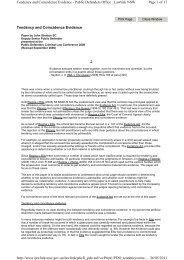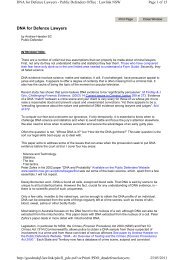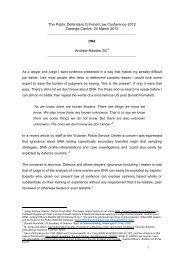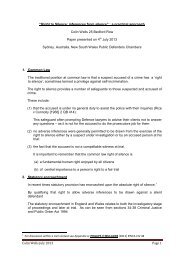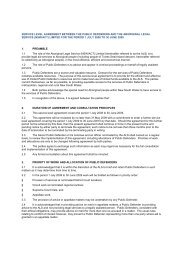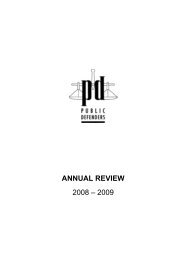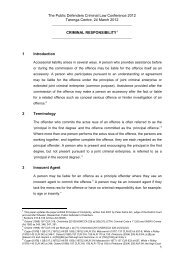Expert Evidence, by Dina Yehia SC - The Public Defenders
Expert Evidence, by Dina Yehia SC - The Public Defenders
Expert Evidence, by Dina Yehia SC - The Public Defenders
You also want an ePaper? Increase the reach of your titles
YUMPU automatically turns print PDFs into web optimized ePapers that Google loves.
That called for some assessment of the reliability and quality of the evidence, matters<br />
ordinarily viewed as being separate and distinct from the credibility of the witness from<br />
whom the evidence was to be elicited”<br />
<strong>The</strong> unmistakable legislative intent is that the test under s 137 should continue to be informed <strong>by</strong>, and applied<br />
in conformity with, its common law origins. R v Christie transformed the practice of not admitting certain types<br />
of evidence into a discretionary rule of exclusion, to be exercised where the accused would be prejudiced. In<br />
Dupas, the Court noted, at [71]<br />
“<strong>The</strong> practice concerned admissible evidence which was viewed <strong>by</strong> the trial judge as having<br />
‘little value in its direct bearing upon the case’ but might “operate seriously to the prejudice of<br />
the accused’. <strong>The</strong> rule was intended to enable the exclusion of evidence that had little<br />
evidential value but might affect the minds of the jury and so seriously prejudice the fairness<br />
of the trial.”<br />
In Dupas, the Court expressed the following conclusions (at para 63):<br />
63 For the following reasons, we are compelled to the view that Shamouil and the other<br />
decisions that have applied it are manifestly wrong and should not be followed. We are<br />
compelled to the conclusion that we should depart from the reasoning and conclusion in<br />
Shamouil as error can be demonstrated with a degree of clarity <strong>by</strong> the application of the<br />
correct legal analysis.[9] Our conclusions are as follows:<br />
(a) <strong>The</strong> common law did require the trial judge, in assessing probative value, to evaluate the<br />
weight that the jury could rationally attach to the evidence. <strong>The</strong> contrary conclusion was<br />
inconsistent with a continuous line of High Court authority.<br />
(b) <strong>The</strong> legislative intention, as disclosed <strong>by</strong> the language of s 137 and its context, is that the<br />
task under s 137 is the same as that at common law.<br />
(c) <strong>The</strong> trial judge undertaking the balancing task is only obliged to assume that the jury will<br />
accept the evidence to be truthful but is not required to make an assumption that its reliability<br />
will be accepted. <strong>The</strong> phrase ‘taken at its highest’ is more appropriately used in considering<br />
a no case submission, when the judge must accept that the jury may find the evidence<br />
credible and reliable.<br />
(d) In order to determine the capacity of the evidence rationally to affect the determination of<br />
a fact in issue, the judge is required to make some assessment of the weight that the jury<br />
could, acting reasonably, give to that evidence. Where it is contended that the quality or<br />
frailties of the evidence would result in the jury attaching more weight to the evidence than it<br />
deserved, the trial judge is obliged to assess the extent of the risk. That does not require the<br />
trial judge to anticipate the weight that the jury would or will attach to it. <strong>The</strong> judge is obliged<br />
to assess what probative value the jury could assign to the evidence, against which must be<br />
balanced the risk that the jury will give the evidence disproportionate weight.<br />
(e) So to construe s 137 accords with the language of the statute and its context. To<br />
construe it otherwise does not.<br />
(f) Such a construction does not involve any enlargement of the powers of a trial judge or<br />
any encroachment upon the traditional jury function.<br />
CONCLUSION<br />
<strong>The</strong> probative value of scientific evidence can be very compelling. Where the science is valid and the expert<br />
opinion based on established and peer reviewed scientific foundation, there is legitimate basis for its<br />
admission into evidence.<br />
24


